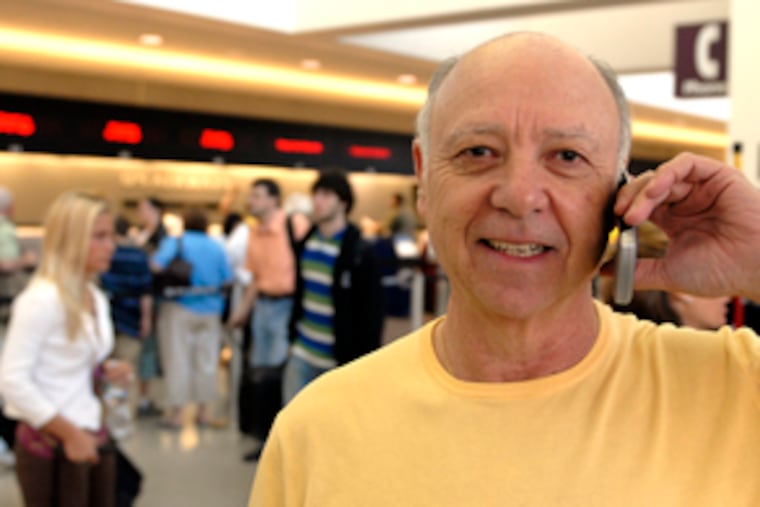Cell phones still fiercely opposed on planes
The very idea of airlines allowing passengers to talk on cell phones during flights reminds frequent flier Alvin Kolchins of the movie Snakes on a Plane.

The very idea of airlines allowing passengers to talk on cell phones during flights reminds frequent flier Alvin Kolchins of the movie
Snakes on a Plane
.
"I'm not sure which would be worse, but my vote goes to . . . cell phones," said Kolchins, a Penn Valley resident who sells life insurance and annuities. "At least with the snakes, they are quiet and can only bite and kill you."
Kolchins is one of millions of airline customers and employees who were horrified at a recent report that the European Union had cleared the way for carriers to allow the use of cell phones while planes are in the air.
"What a horrible thought," said Priscilla Sharpless, a travel agent who lives in Phoenixville. "Flying is miserable enough these days without having to listen to people yakking on their cell phones at close quarters."
Fortunately for American travelers, already weary of cramped cabins and chronic delays, there appears to be little chance that the Federal Communications Commission will lift its ban on using phones in flight in this country. The FCC ban - originally adopted in 1961 and later updated - was meant to prevent any interference with a plane's navigational instruments or disruption of phone service on the ground.
U.S. airlines aren't clamoring to change the rule. Flight attendants in particular are adamantly opposed to ending the ban, fearful that without it, confrontations between passengers would become common. And just in case an airline were to consider it, members of Congress are introducing legislation to enshrine the FCC ban in federal law.
The broad opposition may be a telling sign of the times. A dozen years ago when private cell-phone use was exploding and talking anywhere was considered a convenience more than nuisance, trade groups for the airline and electronics industries were expressing hope for easing of the rules due to traveler demand. But two weeks ago, The Inquirer asked readers in its Philly Road Warrior column (
» READ MORE: http://go.philly.com/roadwarrior
) what they thought of the possibility of changing the ban. Kolchins, Sharpless, and more than three dozen others who responded said they were opposed. None was in favor of lifting the ban.
"Cell phones on planes. . . . Four words that strike fear in my heart," wrote Wendy Earle, a marketing specialist from Kulpsville. "Who hasn't experienced the blowhard whose loud end of the conversation can be heard from 100 feet away? Wouldn't you just love to be sitting near him [or her] on a plane?"
Although cell phones increasingly are used for silent text-messaging and e-mailing, it was the prospect of gabby, one-sided conversations popping up throughout a confined aircraft cabin that elicited dread.
Edward Fox, a federal employee who travels to Washington regularly on Amtrak, appreciates the railroad's "quiet cars," one on each Northeast Corridor train, where cell-phone silence is required.
"Until the airlines can have a 'quiet car,' there should be no cell-phone usage," Fox said.
Don Goldkamp, a frequent business traveler who lives in Cedars, Montgomery County, called cell phones on planes "invasive to other passengers. I can't imagine why the airlines would want to make flying less pleasant than it already is," he added.
Objections to changing the rule started soon after the E.U. said on April 9 that midair cell-phone usage could start as soon as airlines could install onboard base stations in their planes. Passengers could turn on phones once a flight has reached 10,000 feet, when other electronic devices such as laptops are allowed.
The European Commission, the E.U.'s executive body, still has to determine what in-flight calls would cost. And the commission urged airlines to set in-flight phone etiquette rules.
"Almost everybody will want to use this service," E.U. spokesman Martin Selmayr told the Associated Press. "We hope that also some people will still use the aircraft as a moment of tranquillity and not disturb other passengers."
After the E.U.'s decision, a bipartisan group of members of the U.S. House Transportation Committee quickly decided not to take a chance that the airlines would seek to change the regulation. They introduced the HANG UP Act - for Halting Airplane Noise to Give Us Peace - that would ban the practice.
"Our bill . . . would ensure that financially strapped airlines don't drive us towards this noisome disruption in search of further revenue," said Rep. Peter DeFrazio (D., Ore.)
The Association of Flight Attendants, a unit of the Communications Workers of America that represents 55,000 employees at 20 airlines, endorsed the proposed legislation and repeated a stance it has had for years. Union president Patricia Friend said airlines traditionally make irrational choices "without considering the consequences, based on perceived 'market' factors." That will make them seek to lift the FCC ban if they think they would be less competitive with European airlines, she said.
"In far too many easily foreseeable operational scenarios, cell-phone use could be worse than a mere nuisance," Friend said. "It could have catastrophic effects on aviation safety and security."
The Air Transport Association, which represents the major carriers, hasn't taken a stand on the European Union decision. Were the restriction to be lifted in this country, "the airlines would have to weigh the benefits," spokesman David Castelveter said. "But you don't want to benefit a few and annoy the many."
Among the reasons airlines should not want to change the rule would be a loss of business from some customers, one of them added.
"The thought of allowing cell-phone use on planes terrifies me," said Earle, the traveler from Kulpsville. "If it happens in the U.S., that will be the final straw. If I can't get there by car or train, I ain't going!"
.